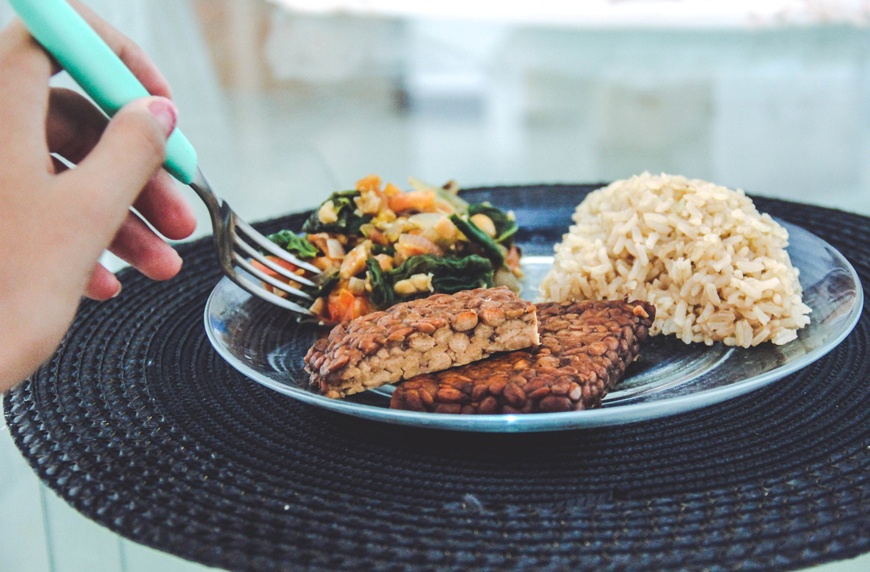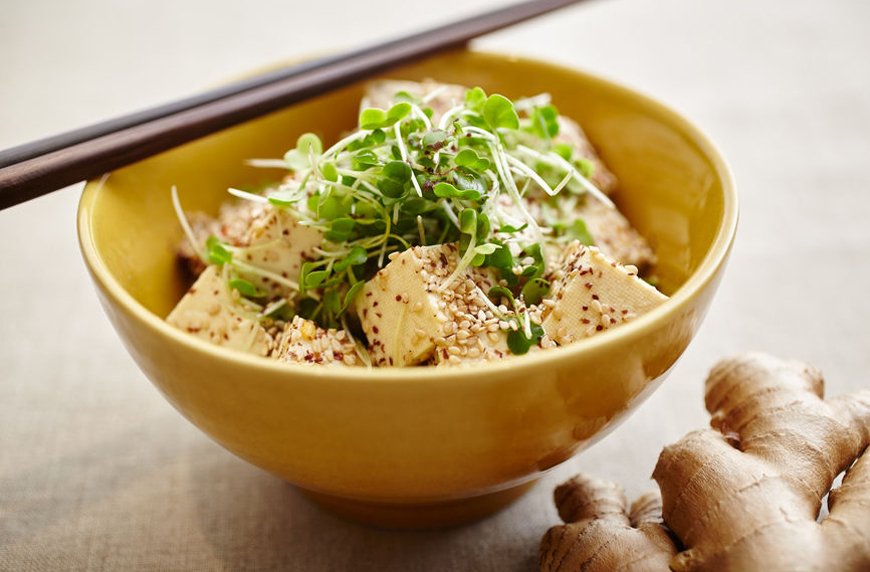Considering even meat-eaters could benefit from regularly eating plant-based meals ( # MeatlessMonday, anyone ? ! ), I asked plant-based specialist Lori Zanini, RD, CDE and author of the Diabetes Cookbook and Meal Plan for the Newly Diagnosed and Reema Kanda, RDN, at Hoag Orthopedic Institute, Irvine CA to break down health differences between the two vegan proteins that get the most love.
Below, Zanini and Kanda explain these two meatless faves and then answer which ultimately wins out in the plant-based protein battle of tempeh vs. tofu.

What is tempeh, exactly?
Tempeh is made from ferment soybeans that have been soaked, hulled, cooked, and then molded into a patty-like form. Of course, there ‘s some variation in the shape the cooked soy sauce beans get molded into, like tempeh sold in bacon-like strips.
Related Stories
While fermented soybeans are the chief ingredient, tempeh much contains any or all of the following : quinoa, barley millet, flax seed, brown rice, sesame seeds and spices. This means sometimes tempeh is gluten-free, but other times it is notHave you ever been cheated on during the vacation season ? ; it ultimately comes down to the manufacturer. Most tempeh products crafty either “ gluten-free ” or “ contains wheat ” on the software, so if you ‘re celiac make sure to do your label-reading before adding it to your grocery cart. The taste of tempeh is often described as “ earthy, ” “ hearty, ” or “ balmy, ” and when cooked, it ‘s a bit chewy. Tempeh is a short like mushroom lattes — you either love it or hate it. 
And what’s tofu?
“ While both tofu and tempeh are high quality sources of plant-based protein and would make a great post-workout meal, they could n’t be more unlike in their product procedure, ” says Kanda. Tofu is besides a soy product, but while tempeh is made directly from cooking and fermenting soybeans, bean curd is made from condensed, fresh soy sauce milk that ‘s been processed into solid white blocks. It can be a little hard to visualize, so think about it this room : You know the pulp that ‘s left over when you make almond milk ? Tofu is basically made by combining this “ pulp ” with a thicken coagulant ( and urine ). That ‘s why bean curd is sometimes considered more refined than tempeh. You can get tofu in a variety of textures such as “ satiny, ” “ firm, ” and “ delicate, ” but it normally has a Jell-O-like jiggle. And while tofu can be sold spiced, it ‘s by and large bland. “ Because tempeh has a heartier taste, some people prefer to use it as kernel substitute. Tofu on the other hand has a more neutral spirit and absorbs the taste of the other ingredients or spices it ‘s combined with. It can be used in smoothies, stir-fries, soups …, ” says Kanda, adding that it ‘s a good replacement for eggs in many dishes.
Read more: Best Chinese Food in DC
Tofu vs. tempeh: Which is healthier?
“ nutritionally, bean curd and tempeh carry very exchangeable food profiles, and either would make a beneficial addition to a goodly breakfast or meal, ” Zanini says, but she adds that they do have differences. nutritionally, here ‘s how it all breaks down based on one service ( aka 100 grams ) of each protein. Tofu:
- Protein: 8 grams
- Fat: 5 grams
- Carbohydrates: 2 grams
- Calories: 76
Tempeh:
- Protein: 20 grams
- Fat: 12 grams per 100g of cooked tempeh
- Carbohydrates: 8 grams
- Calories: 195
broadly, tempeh is higher in protein than bean curd. “ That ‘s because legumes, grains, nuts, and seeds may be used to make tempeh, ” says Kanda—lending to a richer source of protein. If your finish is to incorporate more protein and healthy fats, tempeh may be the way to go. Tempeh may have more calories and fat content, but Kanda says comparing two 100 gram servings is slightly misinform because 100 grams of tempeh will be more fill than 100 grams of bean curd, thanks to its high protein and fiber. You may have to eat more bean curd to feel broad because one serve is so low in calories, protein, and fat. Micronutrients flush in the nitty farinaceous nutrient-details, there are n’t a long ton of differences between the two soy products. “ Tofu contains 1 milligram of iron per serve and is a reservoir of alpha-linolenic acid, the necessity omega-3 fatty acid fatty acid. Some brands of bean curd are fortified with vitamin B12 and vitamin D, and extra calcium—of which there ‘s naturally a distribute, ” says Kanda. Tempeh on the other pass, contains about 10 percentage of your day by day iron and calcium needs. Because tempeh is fermented, it can help your gut health and will keep you regular. Both bean curd and tempeh incorporate magnesium, potassium, sodium and zinc. Other factors, tastes, and uses aside from the nutritional information, there ‘s the hale interview about whether or not soy is actually condom to eat. While some health practitioners advise their patients not to eat soy due to its “ estrogen-like effects ” in the body, the american english Cancer Society says that consuming control amounts of soy foods is condom for everyone. Kanda follows the ACS guideline, and encourages her patients to eat soy in easing and not every sidereal day.
Of course, since both tofu and tempeh can be part of a healthy diet, a fortune of the decision comes toss off to what you ‘re craving and how you cook them. “ Either option would be a bang-up meat-substitute in any meal, ” says Zanini. But when your shop for tempeh aim for one that is a childlike as possible. Flavored tempeh much has a fortune of add boodle and salt. And of course, if you ‘re gluten-free check the label. While tempeh has a heartier taste that makes it optimum as a meat-replacement, bean curd is basically bland which means it has more culinary uses. “ Either way, ” says Kanda, “ both offer a great complete protein option for plant-eaters. ” Try this 15-minute sweet potato and tempeh taco recipe from Thug Kitchen. If you’re not a fan of tempeh’s texture or taste and prefer tofu instead, try Chloe Coscarelli’s spicy chipotle mango tofu tacos.


